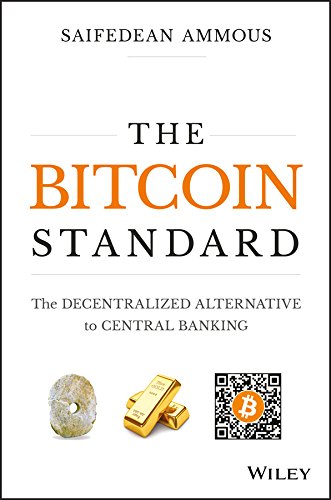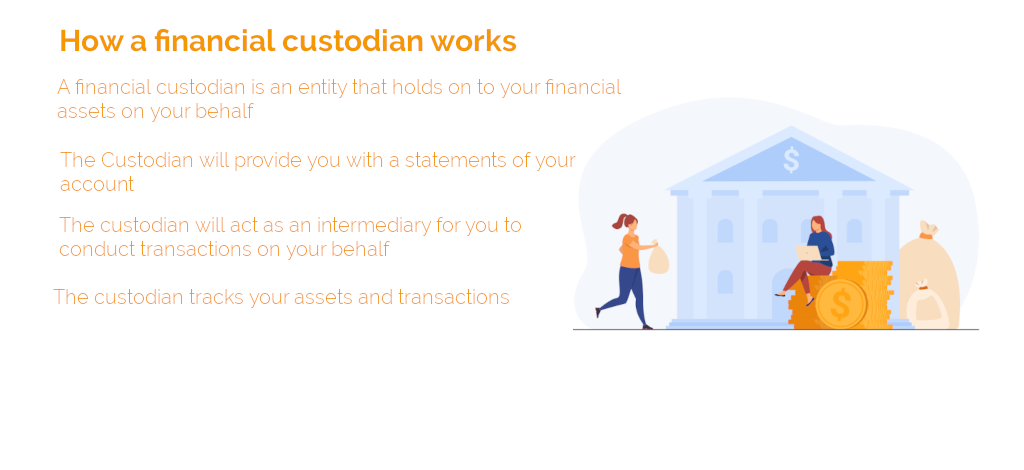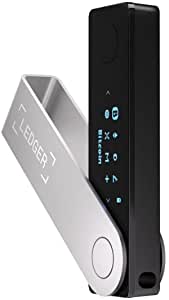In going down the crypto rabbit hole I discussed how journey into the world of cryptocurrency is so much more than learning about a new technology. It's merely one aspect of crypto and if I'm honest it's probably the most uninteresting side.
Cryptocurrency and more specifically Bitcoin is truly a revolutionary concept that will in time completely change our world, simply is a just a matter of time. Bitcoin is here to stay while other cryptocurrencies will come and go.
Taking the time to read and digest The Bitcoin Standard: The Decentralized Alternative to Central Banking will undoubtedly help you to appreciate what, how and why this innovation has the potential to change everything we currently experience from global finance and economics.
The Bitcoin Standard
The Decentralized Alternative to Central Banking
The Bitcoin Standard analyses the historical context to the rise of Bitcoin, the economic properties that have allowed it to grow quickly, and its likely economic, political, and social implications
If you're looking for a far more gentler introduction with some humour, I would suggest reading Bitcoin The future of money. Reading both books is, in my opinion, advisable. If only to learn that one of the key concepts to understand about Bitcoin and for the most part Cryptocurrencies is that they remove the completely unnecessary layers of banking. More importantly it removes the ability of banks to effectively create new money out of thin air and escape the falsehood of continual economic growth.
Economic growth is nothing more than continual debt expansion
In order to completely remove the totally unnecessary middle men, known as banks from our future lives, we all have to understand to understand the importance of self custody.
What is Self Custody
In order to understand what self custody it's important to understand what a custody is and it's role in the financial sector and how banks currently perform this role for you in the current financial system with a couple of hidden gotcha's that you may or may not be aware of.
What is a Custodian
The term custodian in law and finance is defined as:
An entity or person who has the legal right to manage and look after another person or entities money, investments of finances
A custodian is legally responsible for ensuring that an item or person is safe and secure. In investment terms, a custodian is the financial services company that maintains electronic records of financial assets or has physical possession of specific securities. Custodians charge fees from their clients for providing these services, which are mostly based on value of assets held by them on behalf of their clients.
Banks are a very typical example of a custodian model, they also happen to be a prime example of why it can quite often be not the best model.
It is in all likelihood, that you may get your salary paid into your bank account because after all the bank is a safe and secure place to store your money. You may use a Debit Card or even Cheque account to take your money out or spend your money. However, what many people don't realise is that once you pay your money into your bank account, it is no longer your money in actual fact you have transferred ownership of your money and it is now banks money, which they charge you to use.
In Life after the state: Why we don't need government, Dominic Frisby discusses this in depth and just how the banks use your money to make more money out of thin air, in a concept known Fractional Reserve Banking . This where the banks only hold on deposit a fraction of the paper money or debt they have on account.
Banks need to hold a quantity of reserve assets for prudential purposes. If a bank falls to its minimum desired level of reserve assets it will have to turn away requests for loans or else seek to acquire additional reserve assets from which to expand its lending.
Introduction to Banking
Cryptocurrency exchanges
Cryptocurrency exchanges often operate in similar approach to banks.
What is a cryptocurrency exchange
Cryptocurrency exchanges are online platforms where you can exchange one cryptocurrency for another cryptocurrency or for fiat currency. They act similar to stock exchange or a currency exchange and often they will provide what is termed as custodial wallet.
What is a custodial wallet
A Cryptocurrency wallet is an address that records buying and selling assets on the blockchain. Essentially, It is an app that allows you to transfer or store your cryptocurrency.
A custodial wallet is similar to a bank account. You have to give all the details and trust to the third party. With the custodial wallet, another party controls your private keys. They secure your funds and return them whenever you want. These days custodial wallets are web-based exchange wallets.
When using a custodial wallet your tokens are actually held in a pool of funds on the exchanges private network and they manage balances on a native ledger. These exchanges store the bulk of user funds in one or more cold wallets that are often insured and also secured behind multiple signatures to prevent theft. A portion of user funds is kept on hot wallets connected to the internet. This is the portion that is tapped into when users want to make a small trade or withdraw some of their balance.
If you're thinking that Custodial Wallets sounds remarkably similar to the concept of Fractional Reserve Banking, you're not far wrong because in essence the practice is similar. Custodial wallets are often crypto locked into an exchange.
The Bitcoin white paper by Satoshi Nakamoto (2008) was motivated in part by a desire to eliminate the need for trusted third parties such as banks. Subsequently, much of the enthusiasm for bitcoin has come from people who desire a currency that is free from the control of the state, banks and other third parties.
Advantages of custodial wallets
- Accessibility: Most exchanges make installing, learning and using their custodial wallet really simple. Transactions on the exchanges are a bit cheaper compared to non-custodial wallets.
- Customer Support: custodial wallets generally provide a customer support services to help you recover your account and any other issues you may experience.
- Convenience: Custodial wallets are a perfect choice for new crypto users. Making it easier for you to trade without worrying about losing your keys
Non-Custodial Wallet
Non-custodial crypto wallets provide you with direct access to public blockchains. They provide complete control of your keys and eliminate the third party between your and your crypto.
A non-custodial wallet is the most secure option in the sense that you and no one else is in full control of the crypto in your wallet. Your keys are stored on your device and they are entirely your responsibly.
Non-custodial exchanges are more difficult to use than custodial exchanges, but they allow users to perform private P2P crypto trades , including trades on coins that aren’t listed on exchanges, eliminate third-party risk, and maintain decentralisation.
Types of Non-Custodial Wallets
Hardware Wallets: Physical devices that can hold users’ crypto funds and are not connected to the internet.
Examples include Ledger & Trezor
Web-Based Wallets : With a private key login, these can be accessed from any device with internet access. Web-based non-custodial exchange systems include Metamask, Brave Wallet among others.
Mobile Wallets: Services like WalletConnect are a non-custodial exchange that allows users to rapidly build a wallet and send money to other wallets by scanning a QR code.
Advantages of Non-Custodial Wallets
Control over assets: individual access to funds to users. There is no third party to handle, limit, secure or manage your assets or activities. You are entirely responsible for your own assets.
Instant Transactions: wallets do not require third party approval for any transaction to be performed. streamlining the process and makes transactions easier.
Secure: non-custodial wallets don’t require you to trust a third party, they require you to trust yourself to keep your keys and your wallet secure. If you were to lose or destroy your wallet, or forget your password, and you haven’t taken precautions to be able to regenerate your wallet, you could lose access to your funds.
Points to consider when choosing between Custodian and Non-Custodial wallets
Personally I have multiple wallets of various types and I make use of both Custodial and Non-Custodial wallets. In my opinion there is no one size fits all approach when it comes to managing your crypto portfolio.
Fundamentally it comes down to which use case you are intending to satisfy. For instance, in my case I predominantly purchase Bitcoin (BTC) to HODL for up to 4 years or more, so in this case security is of paramount importance therefore I have split my portfolio of bitcoin across a number of Cold Storage hardware wallets like Ledger Nano S, which I have no intention of using to spend my bitcoin, I only ever access the devices and wallets when I want to add more BTC.
I also have Ledger nano X wallets, which I use to store Tezos, ETH and Cardano, which I able to also earn additional revenue from my staking.
I also frequently use Custodial Wallets like Crypto.com, Coinbase, Uphold and Gemini to Buy and Hold assets over shorter timescales. I'm not a trader per se, but I do often make investments over shorter scales i.e. 3-6 months. In these scenarios and use cases I find custodial wallets satisfactory. My mindset in these circumstances is that I could afford to lose the money I have invested so therefore content with the risk of leaving these assets in Hot Wallet for shorter time-frames.
custodial wallet solutions include investing in crypto ETFs and ETPs. These newer options are gaining popularity with institutional investors seeking more investment exposure to cryptocurrency and tokens. They offer an option to invest in cryptocurrency that doesn’t require managing keys or transacting on the blockchain.
Taking Personal Responsibility for Your Assets
Non-custodial crypto wallets give you complete control of your keys and therefore your funds. So make complete sense for people who want to store their assets for a long time.
While some people store large amounts of crypto on exchange accounts, many feel more comfortable with a non-custodial wallet, which eliminates a third-party between you and your crypto.
Non-custodial wallets can be browser-based, they can come in the form of software installed on mobile devices or on desktops, or they can be hardware devices, among other options. Although they can take many forms, the most secure way to hold your cryptocurrency is using hardware wallets.
I prefer to use Ledger Nano X Crypto Hardware Wallet an Intuitive crypto wallet which is perfect for beginners and veterans alike.
- What is this Directory.Packages.props file all about? - January 25, 2024
- How to add Tailwind CSS to Blazor website - November 20, 2023
- How to deploy a Blazor site to Netlify - November 17, 2023




